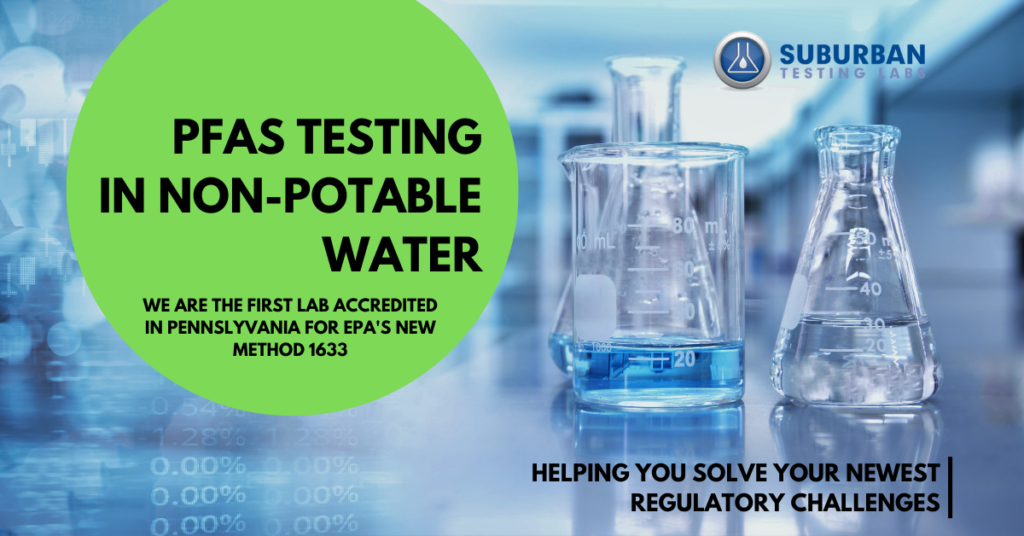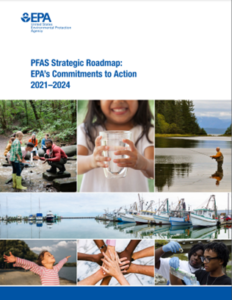Introducing New Method for Analysis of PFAS in Non-Potable Water
 The first laboratory in Pennsylvania Accredited for EPA Method 1633.
The first laboratory in Pennsylvania Accredited for EPA Method 1633.
Friday, July 15, 2022, 07:00 AM EST
Reading, PA – Suburban Testing Labs has become the first environmental testing lab in Pennsylvania accredited for the newly EPA-approved draft test method for analysis of Per/Poly-Fluoroalkyl Substances (PFAS) in non-potable water, EPA Method 1633. They will begin taking samples for EPA 1633 starting August 8, 2022.
PFAS Exposure from Non-Potable Water
According to the USEPA, humans are exposed to PFAS in various ways. Manufacturing or chemical production facilities that discharge into publicly owned wastewater treatment facilities (POTWs) that do not treat incoming wastewater for these contaminants can cause discharged water and biosolids to be contaminated with these harmful compounds. Wastewater discharged to our waterways from treatment plants could be a source of contamination in fish and drinking water supplies. Contaminated biosolids used as fertilizer on agricultural lands can affect ground and surface water and animals grazing on the land.
Sampling and testing at various points of the collection system, industrial discharges, the influent, the effluent, and in biosolids is a vital way wastewater treatment plants can understand how much PFAS they are dealing with and what the sources may be.
PFAS Testing Regulations
In June 2022, the USEPA announced four health advisories for PFAS as a part of the EPA Administrator’s PFAS Strategic Roadmap. 
In addition to addressing PFAS in drinking water, this strategic roadmap also plans to restrict discharges from industrial sources through the Effluent Limitations Guidelines program (Industrial Pretreatment) and leverage NPDES permitting to reduce PFAS discharges to waterways. EPA expects information to be released in winter 2022.
In the meantime, non-potable water treatment facilities are investigating PFAS levels independently. The EPA 1633 draft method is proposed but considered approved for PFAS analysis in non-potable water as it goes through the formal approval process.
Many states, such as New Jersey, have adopted acceptable limits for PFAS in drinking water, and many more are expected to follow. Pennsylvania recently proposed limits for PFAS in drinking water, and regulations will be fast-tracked. All public water suppliers serving a population of more than 3,300 will be required to test for 29 PFAS compounds between 2023-2025.
Testing for PFAS
EPA Method 1633 includes 40 PFAS Analytes (click here for list including MRLs). The analysis is performed by a solid-phase extraction (SPE) on the sample, followed by analysis using Liquid Chromatography with tandem Mass Spectrometry (LC-MS-MS). We are also accredited to perform analysis for PFAS in drinking water PFAS – PFOA, PFOS, PFNA and More in Drinking Water via method 537.1, and are an EPA approved lab for UCMR5 PFAS Analysis.
Analysis occurs at our headquarters without needing to ship samples to an out-of-state facility. Knowing your samples are handled at our lab without the possibility of shipping delays gives our clients peace of mind.
Accredited laboratories performing PFAS analysis in Pennsylvania, New Jersey, Maryland, and Delaware are extremely rare. Suburban Testing Labs is proud to be the first laboratory in PA to gain this accreditation and will serve clients in these four states.
